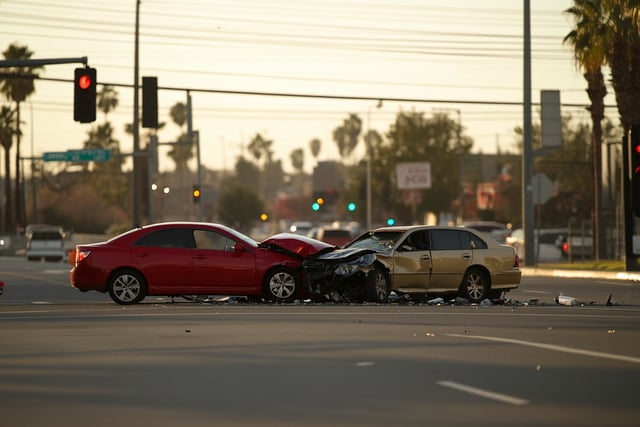
Multi-car collisions are among the most complex types of traffic accidents. Unlike two-vehicle crashes, these incidents often involve multiple impact points, conflicting witness statements, and a chain reaction. Determining liability can be challenging, as fault may be shared among several drivers, influenced by everything from speeding and tailgating to poor weather or road conditions.
Sorting through the aftermath of a multi-car accident requires careful examination of each driver’s role and the circumstances leading up to the crash. Investigations often rely on police reports, vehicle damage patterns, and available surveillance footage. Consulting a Memphis, TN car accident attorney can help clarify legal responsibilities and protect your rights, primarily when insurance companies dispute fault or offer conflicting narratives. Understanding liability in these situations is essential for pursuing fair compensation and resolving claims effectively.
Common Causes of Multi-Car Collisions
Multi-car collisions often occur due to factors that increase the likelihood of chain-reaction crashes. Common causes include following too closely, distracted driving, and sudden braking in heavy traffic. Poor weather conditions like fog, rain, or ice can reduce visibility and traction, making it harder for drivers to react quickly. Speeding and aggressive lane changes also contribute, especially on highways where vehicles travel at high speeds in close proximity. Sometimes, a single driver’s mistake can trigger a series of impacts involving multiple cars. Recognizing these risks is essential to promoting safer driving habits and preventing pile-ups.
Determining Liability in Multi-Car Accidents
Determining liability in multi-car accidents can be particularly complicated due to the number of vehicles and drivers involved. Investigators must assess a sequence of events, analyzing who initiated the collision and how each subsequent impact occurred. Fault may be shared among multiple parties, especially when drivers fail to maintain safe distances, follow traffic signals, or adjust to road conditions. Evidence such as dashcam footage, eyewitness statements, and accident reconstruction reports can be critical in establishing responsibility. Insurance companies and legal professionals often work together to piece together the chain of events, ensuring that liability is assigned fairly and supported by available facts.
State-Specific Laws and Comparative Negligence
Laws governing liability in multi-car collisions differ by state, with a significant impact on outcomes for those involved:
- California: Employs a pure comparative negligence model, allowing victims to recover damages reduced by their share of fault—even up to 99%.
- Pennsylvania: Utilizes modified comparative negligence; if you are 51% or more at fault, you are barred from recovering damages.
- Georgia: Similar to Pennsylvania, but the threshold is 50%—cross that line, and you cannot claim compensation.
This variability underscores the importance of understanding your local legal framework and how it can affect your ability to seek or defend against claims. For more guidelines on comparative negligence by state, refer to this resource from Justia.
Steps to Take After a Multi-Car Collision
- Ensure Safety: If possible, move vehicles and passengers to a secure spot and assess any injuries immediately.
- Call Emergency Services: Notify law enforcement and seek medical attention, even for minor injuries that may worsen over time.
- Document the Scene: Take photos of car positions, visible damage, road conditions, and any traffic control devices or signals relevant to the crash.
- Gather Information: Obtain names, contact details, and insurance information from all involved drivers, and request contact information from witnesses.
- Consult an Attorney: An experienced attorney can guide you through complex claims processes and represent your best interests in negotiations or court proceedings.
Quick response is fundamental—evidence can disappear, and recollections can change. Promptly securing legal advice positions you for a more favorable outcome.
Disclaimer
Artificial Intelligence Disclosure & Legal Disclaimer
AI Content Policy.
To provide our readers with timely and comprehensive coverage, South Florida Reporter uses artificial intelligence (AI) to assist in producing certain articles and visual content.
Articles: AI may be used to assist in research, structural drafting, or data analysis. All AI-assisted text is reviewed and edited by our team to ensure accuracy and adherence to our editorial standards.
Images: Any imagery generated or significantly altered by AI is clearly marked with a disclaimer or watermark to distinguish it from traditional photography or editorial illustrations.
General Disclaimer
The information contained in South Florida Reporter is for general information purposes only.
South Florida Reporter assumes no responsibility for errors or omissions in the contents of the Service. In no event shall South Florida Reporter be liable for any special, direct, indirect, consequential, or incidental damages or any damages whatsoever, whether in an action of contract, negligence or other tort, arising out of or in connection with the use of the Service or the contents of the Service.
The Company reserves the right to make additions, deletions, or modifications to the contents of the Service at any time without prior notice. The Company does not warrant that the Service is free of viruses or other harmful components.












